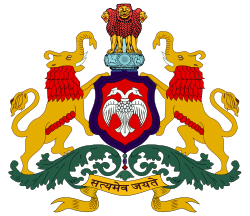History
Mysore Representative Assembly was constituted in 1881 by Maharaja Chamaraja Wadiyar X, the first of its kind in princely India. It formed the Kingdom's sole unicameral legislature until when, in 1907, an upper house was carved out of it to form the Mysore Legislative Council, resulting in the Assembly's functioning as the lower house.
On 16 December 1949, Maharaja Jayachamaraja Wadiyar dissolved the sitting representative and legislative assemblies. A constituent assembly that was constituted in 1947 became the provisional assembly of Mysore until elections were held in 1952.
On Wednesday, 18 June 1952, at 11:00 am, the first session of the newly-formed Mysore Legislative Assembly was held at a conference hall in the old Public Offices building (the Attara Kacheri, the current seat of the Karnataka High Court) in Bangalore. The first assembly in Mysore formed under the Constitution of India, it had 99 elected members and one nominated member. In the first sitting of the assembly, V. Venkatappa, the honorary speaker, administered the oath of office to the members (including the then Chief Minister Kengal Hanumanthaiah), and then conducted an election to the post of speaker, which was contested by socialist leader Shantaveri Gopalagowda and H. Siddaiah. With 74 votes, the latter won, and Hanumanthaiah delivered a speech.
With the formation of Andhra state in 1953, parts of Bellary district from Madras State were added to Mysore state and the strength of the Assembly increased by five members. After the re-organization of the state of Mysore came into being on 1 November 1956 with four districts from the former Bombay state, three districts of Hyderabad state, a district, and taluk of the old Madras state of Coorg, and the princely state of Mysore. The state was renamed Karnataka in 1973.
The first sitting of the new assembly was held on 19 December 1956 in the newly built Vidhana Soudha. The strength of the assembly, which was 208 in 1957 increased to 216 in 1967 and to 224 plus a nominated member in 1978.
As of 2025, the only woman to have held the post of Speaker was K. S. Nagarathanamma, who served from 24 March 1972 to 3 March 1978.
The Budget Session and the Monsoon Session of the Legislature are held in Vidhana Soudha, Bengaluru. The Winter Session of the Legislature is held in Suvarna Vidhana Soudha in Belagavi.
| Assembly | Period | Chief Minister(s) | Duration |
|---|
| First Assembly | 18 June 1952 – 1 April 1957 | Kengal Hanumanthaiah, Kadidal Manjappa, S. Nijalingappa | 4 years, 287 days |
| Second Assembly | 19 April 1957 – 1 March 1962 | S. Nijalingappa, B.D. Jatti | 4 years, 316 days |
| Third Assembly | 15 March 1962 – 28 February 1967 | S. R. Kanthi, S. Nijalingappa | 4 years, 350 days |
| Fourth Assembly | 15 March 1967 – 14 April 1971 | S. Nijalingappa, Veerendra Patil | 4 years, 30 days |
| Fifth Assembly | 24 March 1972 – 31 December 1977 (Dissolved) | D. Devaraj Urs | 5 years, 282 days |
| Sixth Assembly | 17 March 1978 – 8 June 1983 (Dissolved) | D. Devaraj Urs, R. Gundu Rao | 5 years, 83 days |
| Seventh Assembly | 24 July 1983 – 2 January 1985 (Dissolved) | Ramakrishna Hegde | 1 year, 162 days |
| Eighth Assembly | 18 March 1985 – 21 April 1989 (Dissolved) | Ramakrishna Hegde, S. R. Bommai | 4 years, 34 days |
| Ninth Assembly | 18 December 1989 – 20 September 1994 (Dissolved) | Veerendra Patil, S.Bangarappa, M. Veerappa Moily | 4 years, 276 days |
| Tenth Assembly | 25 December 1994 – 22 July 1999 (Dissolved) | H.D. Deve Gowda, J. H. Patel | 4 years, 209 days |
| Eleventh Assembly | 25 October 1999 – 28 May 2004 | S. M. Krishna | 4 years, 216 days |
| Twelfth Assembly | 28 May 2004 – 19 November 2007 (Dissolved) | Dharam Singh, H. D. Kumaraswamy, B. S. Yeddyurappa | 3 years, 175 days |
| Thirteenth Assembly | 30 May 2008 – 5 May 2013 | B. S. Yeddyurappa, D.V. Sadananda Gowda, Jagadish Shettar | 4 years, 340 days |
| Fourteenth Assembly | 13 May 2013 – 15 May 2018 | Siddaramaiah | 5 years, 2 days |
| Fifteenth Assembly | 16 May 2018 – 13 May 2023 | B.S. Yeddyurappa, H. D. Kumaraswamy, B. S. Yeddyurappa, Basavaraj Bommai | 4 years, 362 days |
| Sixteenth Assembly | 20 May 2023 – Present | Siddaramaiah | 1 year, 187 days |
This page is based on this
Wikipedia article Text is available under the
CC BY-SA 4.0 license; additional terms may apply.
Images, videos and audio are available under their respective licenses.




